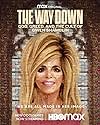I'll break this review into two pieces: technique and content.
Technique: This is a serviceable three-episode docu-series mixing the usual talking-head interviews and footage with the occasional reenactment. Since watching, I've learned that production began before the death of the main subject. Perhaps that accounts for some of the odd narrative, the way the timeline jumps around. And how the main storylines -- the couple who lost their daughter to the cult, the woman who had a child with one of the cult leaders, and the parents who beat their son to death -- feel disproportionately intermingled.
Content: It was interesting to see some of these escaped members (not to mention the "cult interventionist" who is among the prominent interviewees) practicing their Christian faith. Natasha, who was falsely called a child abuser by her cult-leader baby daddy, can be seen genuflecting in various scenes, even after she left Remnant. The cult interventionist is wearing a cross on the outside of his shirt, presumably to make sure the camera picks it up. Even some of these reviewers on here opine that the Remnant church isn't wrong for being a Christian church, but because it's a "false church."
There seem to be a lot of false churches these days, and the list of religious charlatans grows longer every year. Christians always have some excuse - "well, it's not MY church. That's not MY way of believing." And while Remnant claims the church only follows bible-based teachings, a reviewer here takes umbrage, arguing that Remnant is NOT Bible-based.
And here we have the problem. Worse than the abuses of one church itself is the very essence of modern Christianity in the United States. Any religion that sets people up to fall for things like the "prosperity gospel," and to short change their critical thinking skills for a set of authoritarian principles, is just no good. Period. This is what makes people susceptible to not only terrors like Gwen Shamblin, but Donald J. Trump.
The problem is, religion is interwoven with culture. As the interviewed Southern author notes, the social culture of the south is all the same - there's nobody better than Jesus, and the Bible is literally true. This is a culture that doesn't merely include some religious beliefs, but is utterly entangled with them. This means that if a person wants to practice a religion other than the one infused with their culture, they risk losing everything. Family, friends, and a community they may have known their whole lives. The religion then acts as a social adhesive, and nobody can be free.
They're all trapped in a cult -- and not just one run by a crazy lady with big hair.

























